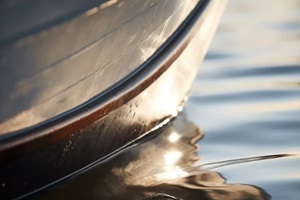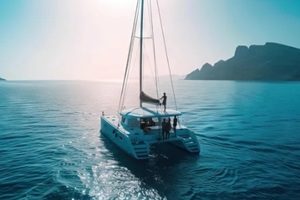 Whether you love cruising the deep blue of the Long Island Sound or exploring the pristine beauty of the Finger Lakes, boating is a cherished pastime for New Yorkers.
Whether you love cruising the deep blue of the Long Island Sound or exploring the pristine beauty of the Finger Lakes, boating is a cherished pastime for New Yorkers.
But before taking your vessel out on any adventure, you should secure the right boat insurance for your unique needs. The requirements for insuring a vessel differ somewhat depending on whether you navigate freshwater or saltwater.
Understanding these key differences is the first step to finding coverage that protects you, your passengers, and your prized boat.
Navigating the Differences: Freshwater vs. Saltwater Boating in NY
The freshwater and saltwater boating conditions in New York come with distinct risks and insurance considerations.
Saltwater Risks
Saltwater vessels face intense corrosion and deterioration from prolonged exposure to the harsh marine environment. The salt accelerates pitting and damage, especially on metal components.
Saltwater boats also require much more frequent and thorough cleaning to prevent the build-up of barnacles on the hull.
Ocean boating also brings the risks of more powerful storms, such as nor’easters and hurricanes, that can swamp or capsize a vessel in large ocean swells.
Freshwater Risks
While freshwater lacks the same corrosion risks, boaters must still contend with potential damage from debris and collisions. Crowded lakes and waterways lead to collision risks, especially during peak boating season.
Submerged logs, rocks, and other debris can also easily damage propellers and clog engine cooling systems.
Another consideration is potential freezing damage if a boat is left in the water during winter months instead of properly winterized and stored.
Tailoring Your Policy: Insurance Considerations for Different Water Types
Your boat insurance should directly address the type of aquatic environment where your boat is used to ensure adequate coverage for the unique risks faced in fresh and saltwater.
For saltwater vessels, it is highly recommended that you opt for an Agreed Value policy rather than an Actual Cash Value policy.
The Agreed Value policy will pay the total replacement cost of the boat in the event of a total loss without depreciation factored in.
Salvage coverage is also a smart addition to cover potential recovery expenses in the ocean. You’ll also want to increase your liability limits to account for the higher costs of repairs and replacement for a saltwater craft.
 Corrosion damage coverage is not typically included in basic policies, so you must add this extra protection. Also, consider extending your navigational limits on the policy to go offshore beyond coastal waterways if that’s your boating style.
Corrosion damage coverage is not typically included in basic policies, so you must add this extra protection. Also, consider extending your navigational limits on the policy to go offshore beyond coastal waterways if that’s your boating style.
Inland marine policies can offer significant savings for freshwater boaters over the more expensive ocean marine insurance plans. It’s best to focus on common mishaps such as collisions, accidents, debris damage, and freezing during winter storage.
Since many freshwater regions in New York are quite remote, having towing insurance is essential in case you break down on a secluded Adirondack lake miles from help.
You can likely get by with lower liability limits compared to ocean boats, given the lower vessel replacement costs.
Essential Coverage for Saltwater Boating: Protecting Against the Harsh Marine Environment
The corrosive powers of saltwater make robust insurance even more important for ocean voyages. Here are some highly recommended policies for saltwater boaters that help safeguard your investment:
- Total loss replacement coverage pays the full agreed-upon value of your boat if it’s completely destroyed and unable to be salvaged, which is preferable over actual cash value policies that pay depreciated value.
- Uninsured boater coverage that protects you in a collision if the at-fault boater lacks sufficient insurance is essential, given the high boat repair and replacement costs.
- Emergency towing insurance can protect you from paying thousands of dollars for long-distance ocean towing.
- Emergency assistance coverage helps pay for fuel delivery, jump starts, and on-water repairs.
- Salvage expense coverage helps cover the potentially enormous costs for salvage operations, including equipment rental, divers, cranes, and professional assistance.
- Hull insurance covers repairs due to collisions, capsizing, swamping, ice damage, vandalism, and explosions. It also protects you against cracks, punctures, and structural damage.
- Fuel-spill liability insurance covers containment, cleanup, and environmental damage from fuel spills, which is required by law for boats with over-the-water fueling.
Safeguarding Freshwater Voyages: Insurance Tips for Lakes and Rivers
Boating on New York’s serene freshwater lakes and winding rivers comes with its insurance considerations. Here are smart tips for comprehensive protection on your favorite Upstate waterway:
- Collision insurance: Your biggest liability risk is other boats and watercraft. Collision coverage helps pay repair bills even if the accident was your fault.
- Emergency roadside assistance: Policies with trailer coverage provide towing, tire changes, jump starts, and locksmith services for when your trailer breaks down.
- Injury liability coverage: Bodily injury liability helps pay medical bills for passengers hurt in an accident on your boat, even for non-crash injuries.
- Submerged object damage: Protects driveshaft, propellers, and engine cooling systems against damage from unseen underwater snags and obstructions.
- Property damage liability: Provides essential coverage if your boat damages a pier, buoy, or other property, easily exceeding tens of thousands of dollars.
- Comprehensive coverage: Pays for damage or losses from theft, vandalism, fire, animal strikes, extreme weather such as hailstorms, and more.
Combining Coverages: A Comprehensive Approach for Versatile Boaters
The ideal solution for boaters who enjoy fresh and saltwater trips is combining policies that offer complete protection. Here are tips for versatile boaters:
 When alternately using fresh and saltwater, opt for the higher saltwater policy limits to ensure sufficient coverage.
When alternately using fresh and saltwater, opt for the higher saltwater policy limits to ensure sufficient coverage.- Extend navigational limits to cover all regions, tributaries, and distances you plan to boat.
- Purchase the salvage, corrosion, and total loss replacement coverages mandatory for ocean boating.
- Include emergency assistance and towing to have seamless coverage across environments.
- Take inventory of all gear and equipment used on the boat to set accurate coverage limits.
- Review exclusions closely to avoid gaps between saltwater and freshwater coverage.
Set Sail with Confidence: Contact JMG Insurance Agency for Your NY Boat Insurance Needs
No two boaters have the exact same marine insurance needs. John M. Glover Insurance Agency offers customized boat insurance solutions explicitly tailored to how and where you boat.
With extensive experience providing coverage for New York boaters, we understand the unique risks faced in both fresh and saltwater environments.
Contact us today at 1-844-304-7332 or online to make sure you have the right insurance package for all your seafaring adventures.



